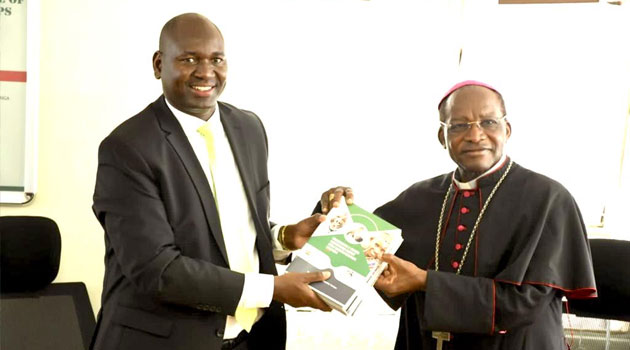By Paschal Norbert
NAIROBI, NOVEMBER 30, 2023 (CISA) – Immigration and Citizen Services Permanent Secretary Ambassador Julius Bitok has termed the claims that newborn babies will be implanted with microchips in the proposed digital identification card rollout as propaganda.
PS Bitok in a meeting with bishop members of the permanent council of the Kenya Conference of Catholic Bishops (KCCB) on November 28 at the Secretariat at Waumini House, Westlands, attributed the scandalous claims to business rivalry among international technology firms that are appalled by the government’s decision to take up local firms in the project.
“The propaganda that we are inserting chips into babies was fueled by them (vendors) as a result of the government’s refusal to take them up on this project,” he said.
The immigration PS explained the rollout of the digital IDs was just an ‘upgrade’ to the current ones being issued and that the decision to contract local IT firms was deliberate to promote local IT enterprises in general, thus, the smear campaigns by leading global technology firms that had sought partnership with the government on the digital IDs.
“Some have wanted to take the Maisha Namba from the ground but we declined their proposal on the basis that this is Kenyan ID and process and we already have a foundational ID. Maisha Namba is just an upgrade,” he stated.
On November 10, 2023, the Catholic Bishops issued a statement after their annual plenary in Nakuru, castigating the rollout of the proposed digital identification as having “an element of violation of the human person, through the use of certain new technology.”
In the statement, the bishops said, “The debate surrounding the proposed digital identification, seems to indicate certain ambiguous components which we seek clarification and public engagement, before any implementation. From what we gather, it targets an element of violation of the human person, through the use of certain new technology. We are therefore raising our concern that a process that involves any insertion of microchips or other digital elements, especially to new-borns, is unacceptable because this would compromise the inviolable dignity of the recipients.”
The prelates had also raised an ‘ethical objection’ to the project, arguing that there was no proper public participation and discussion of the matter.
“We are further worried about the data security of the information collected through digital methods, such as the iris-identification,” they said.
In the Tuesday meeting with PS Bitok, which sought to allay the fears of the Catholic bishops on the new IDs, the prelates reiterated the call for more public participation and stakeholders’ involvement before the rollout.
“Knowledge is power and there is a need to continuously share information with the public to dispel the misinformation out in the public. It is imperative that continuity and diversity in communicating the right information to the public on the project is employed,” said Archbishop Anthony Muheria, chairperson of KCCB’s Social Communication Commission and Archbishop of Nyeri.
Muheria appealed for public sensitization on the project to reach as many people and also the involvement of IT experts from both private and government sectors to evaluate the infrastructure of the project in order to boost public confidence on the matter.
On his part, Archbishop Martin Kivuva Musonde, the president of KCCB and Archbishop of Mombasa, urged the PS to ensure the process was transparent and to make relevant information easily available.
In an interview with the Standard newspaper in October, PS Bitok had said the registration for the proposed digital ID dubbed ‘Maisha Namba’ was not compulsory and that “no one will be forced to take up Maisha Card. The current IDs will continue to be recognized as valid identification documents alongside the new card.”
“All newborns and those registering for IDs for the first time will be issued with a lifetime Maisha Namba that will be the registration number for school, NHIF, KRA and other government services,” he said.
